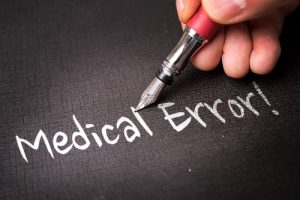No matter how well trained or professional, the chances of a medical malpractice suite during a healthcare professional is very high and likely within their career span. Obviously, doctors have a higher chance than others, but nurses and other aides also face malpractice suites within their careers. Not all malpractice cases have merit and in many cases, the healthcare professional is innocent of wrong doing or following improper procedure or standards of care, but it still can happen and one needs to be prepared for it.

This is why millions each year is spent on malpractice insurance, as well as millions on defense for healthcare professionals in malpractice cases. Numerous firms utilize the insight of Legal Nurse Consultants to help them defend and aide healthcare professionals in various malpractice cases.
If ever served, it can be a scary and confusing moment and it is important to know what to do. The article, “How to navigate a malpractice case” by Chris Mazzolini takes a closer look at how to respond and navigate a malpractice case and how critical legal help is to properly handle the case. In addition, the article points out ways to prevent possible malpractice. The article states,
“The best way to avoid a lawsuit is to have excellent outcomes and results. Most lawsuits arise due to bad outcomes or results. However, even the best doctors can’t get perfect outcomes all the time, despite selecting the best procedures and tests. It is crucial to let the patient know that you care about them and their outcomes, especially when there’s a less-than-perfect outcome. Doctors care desperately for their patients and want to avoid poor outcomes. Excellent communication with the patient and answering their questions is key, as well as documenting all discussions and decisions made. These practices can help in preventing lawsuits.”
“How to navigate a malpractice case”. Chris Mazzolini. April 1st, 2023. Medical Economics.
To review the entire article, please click here
Understanding Medical Malpractice
Medical malpractice is a complex legal concept that can be difficult to understand. Medical malpractice occurs when a healthcare provider fails to meet the standard of care, resulting in harm to a patient. The standard of care is the level of care that a reasonable and prudent healthcare provider would provide under similar circumstances. Medical malpractice cases can arise from a variety of situations, including misdiagnosis, medication errors, surgical errors, and failure to obtain informed consent.
Medical malpractice cases can be challenging to prove, and there are several elements that must be established in order to win a case. These elements include a duty of care, a breach of that duty, causation, and damages. A duty of care exists when a healthcare provider has a legal obligation to provide care to a patient. A breach of that duty occurs when a healthcare provider fails to meet the standard of care. Causation is the link between the breach of duty and the harm suffered by the patient. Damages refer to the harm suffered by the patient as a result of the breach of duty.
Why Medical Malpractice is a Concern for Healthcare Providers
Medical malpractice is a concern for healthcare providers for several reasons. First, medical malpractice cases can be costly. Healthcare providers may be required to pay damages to the patient, as well as legal fees. In addition, medical malpractice cases can be time-consuming, taking healthcare providers away from their patients and causing stress and anxiety.
Medical malpractice cases can also damage a healthcare provider’s reputation. A medical malpractice case can harm a healthcare provider’s standing in the community, as well as their ability to practice medicine. In addition, medical malpractice cases can result in increased scrutiny from regulatory bodies, which can lead to disciplinary action.
Common Causes of Medical Malpractice Cases

There are several common causes of medical malpractice cases. One of the most common causes is misdiagnosis. Misdiagnosis occurs when a healthcare provider fails to correctly identify a patient’s condition. Misdiagnosis can result in delayed treatment, incorrect treatment, or no treatment at all. Misdiagnosis can also result in a patient’s condition worsening, leading to more serious health problems.
Another common cause of medical malpractice cases is medication errors. Medication errors can occur when a healthcare provider prescribes the wrong medication, the wrong dosage, or fails to consider a patient’s medical history. Medication errors can result in serious harm to a patient, including allergic reactions, drug interactions, and overdose.
Surgical errors are also a common cause of medical malpractice cases. Surgical errors can occur when a healthcare provider makes a mistake during a surgical procedure. Surgical errors can result in serious harm to a patient, including infections, nerve damage, and even death.
Best Practices for Avoiding Medical Malpractice Cases
There are several best practices that healthcare providers can follow to avoid medical malpractice cases. One of the most important is effective communication with patients. Healthcare providers should take the time to explain medical conditions, treatment options, and potential risks to patients in a way that they can understand. Effective communication can help patients make informed decisions about their healthcare and can reduce the risk of misunderstandings.
Another best practice is thorough documentation. Healthcare providers should document all patient interactions, including medical history, physical exams, and treatment plans. Thorough documentation can help healthcare providers track a patient’s progress and can provide a record of the care provided.
Healthcare providers should also prioritize patient safety and work to reduce medical errors. This can include implementing safety protocols, such as using checklists and double-checking medications. Healthcare providers should also be open to feedback from patients and colleagues and should use that feedback to improve their practice.
Communication and Documentation Strategies for Healthcare Providers
Effective communication and thorough documentation are essential strategies for avoiding medical malpractice cases. Healthcare providers should prioritize clear and concise communication with patients, using language that patients can understand. Healthcare providers should also take the time to answer patient questions and address any concerns that they may have.
Thorough documentation is also essential for avoiding medical malpractice cases. Healthcare providers should document all patient interactions, including medical history, physical exams, and treatment plans. Documentation should be clear and concise, and should include information about any relevant test results or consultations with other healthcare providers.
In addition, healthcare providers should be aware of the legal requirements for documentation, including the Health Insurance Portability and Accountability Act (HIPAA). HIPAA sets standards for the privacy and security of protected health information, and healthcare providers must ensure that they are compliant with these standards.
Improve Patient Safety and Reduce Medical Errors

Improving patient safety and reducing medical errors is a key strategy for avoiding medical malpractice cases. Healthcare providers can implement a variety of safety protocols to reduce the risk of medical errors. This can include using checklists and double-checking medications.
Healthcare providers should also prioritize continuous learning and professional development. This can include attending conferences and workshops, participating in online training courses, and staying up-to-date with the latest research and best practices in their field.
The Role of Technology in Preventing Medical Malpractice Cases
Technology can play a significant role in preventing medical malpractice cases. Electronic health records (EHRs) can help healthcare providers keep track of patient information and reduce the risk of errors. EHRs can also provide alerts and reminders to healthcare providers, helping them stay on top of patient care.
In addition, telemedicine can help healthcare providers reach patients in remote or underserved areas. Telemedicine can also provide patients with convenient access to healthcare, which can reduce the risk of missed appointments and delayed care.
Importance of Continuous Learning and Professional Development
Continuous learning and professional development are essential strategies for healthcare providers to stay up-to-date with the latest research and best practices in their field. Healthcare providers can attend conferences and workshops, participate in online training courses, and read industry publications to stay informed.
In addition, healthcare providers can seek feedback from patients and colleagues to identify areas for improvement. Healthcare providers can also participate in quality improvement initiatives to improve patient care and reduce the risk of medical errors.
Medical Malpractice Insurance for Healthcare Providers

Medical malpractice insurance is a type of insurance that healthcare providers can purchase to protect themselves from the financial and legal consequences of medical malpractice cases. Medical malpractice insurance can help healthcare providers pay for damages to patients, as well as legal fees and other costs associated with a malpractice case.
Healthcare providers should speak with an insurance agent to determine the appropriate level of coverage for their practice. It is important to note that medical malpractice insurance does not provide immunity from legal action, but can provide financial protection.
If sued in a case, it is important to contact legal representation with expertise in medical malpractice. Many firms utilize legal nurse consultants who have a deep and strong understanding of medical law and standards of care that can serve as expert witnesses and investigators for the case. If served, legal representation can properly answer any questions as well as prepare a defense for the case. They will require records and meetings with the patient. Hopefully, the situation can be resolved in mediation but if not, a good defense team with a legal nurse consultant can help alleviate the stress and worry associated with a malpractice case.
Conclusion

Medical malpractice is a concern for healthcare providers, but there are several strategies that can be implemented to avoid malpractice cases. Effective communication with patients, thorough documentation, and prioritizing patient safety and reducing medical errors can all help healthcare providers avoid malpractice cases. Continuous learning and professional development are also essential strategies for staying up-to-date with the latest research and best practices in the field. Finally, medical malpractice insurance can provide financial protection in the event of a malpractice case. By following these strategies, healthcare providers can provide high-quality care to their patients and avoid the legal and financial consequences of medical malpractice.
